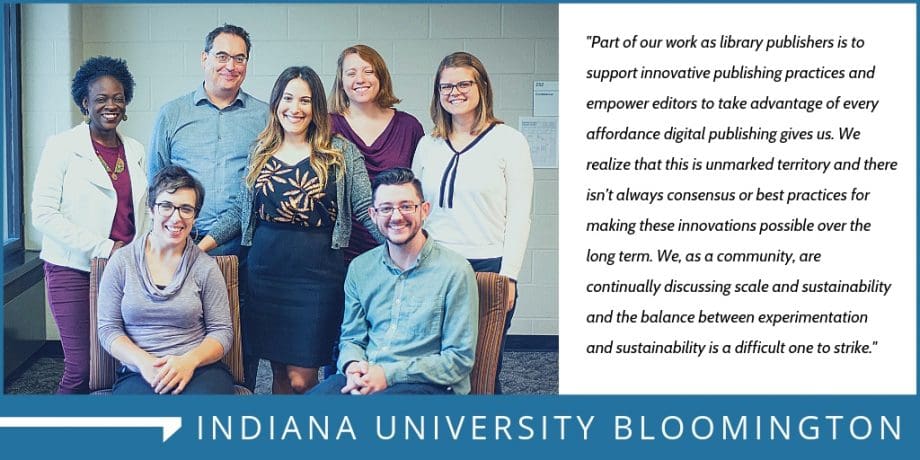
February 13, 2019
Indiana University Bloomington: Educating and onboarding editors with the New Journal Toolkit
By Sarah Hare
In February 2019, we are publishing our second series of member profiles. These profiles showcase the wide variety of publishing work happening at member institutions, and celebrate our community’s contributions to the wider publishing landscape. This series will also spotlight resources the profiled institutions have contributed to the Shared Documentation library. Many thanks to the members who volunteered to answer our questions! See all of the published profiles, and look for a new one each week in February.
This post was written by Sarah Hare and Jenny Hoops.
To learn more about their program, check out Indiana University’s latest Library Publishing Directory entry.
Tell us a bit about your publishing program.
Indiana University Bloomington has been publishing journals using the Public Knowledge Project’s Open Journal Systems platform since 2008. The Office of Scholarly Publishing, a strategic partnership between IU Press and IU Libraries Scholarly Communication Department to support publishing at IU broadly, was created in 2012. The program centers on access: journals only need an Indiana University affiliation to participate in the library publishing program. 50 journals currently participate in the publishing program in some capacity. This includes formally peer-reviewed faculty publications, student journals, informal serials like newsletters, active journals, and journals that are no longer active but have an extensive, open access back list. Journals receive hosting and operational publishing services at no cost, with the exception of more resource-intensive services like copyediting and print on demand.
IU Libraries’ journal publishing program is part of a larger suite of services centered on “open scholarship” and ensuring that all IU affiliates can make their scholarly outputs–including journal articles, book chapters, media, data, and learning objects–open, regardless of the level of openness they are interested in. Other services the library provides include data management planning, assistance finding and creating OER, repository deposit, and consultation on demonstrating impact. These services contribute to the journal publishing program, giving IU affiliates a comprehensive support structure for engaging with openness.
Tell us something you have accomplished with your program that you’re proud of – big or small.
We have reached a major milestone of 50 total journal publications. While our journals were initially focused on folklore, history, and education, we now host journals on university administration, public affairs, optometry, art, and several other subjects, with journals published by faculty, graduate students, and undergraduate students across several schools and departments. We take pride in making our legacy journals with comprehensive backlists more discoverable. For example, recently we have been providing metadata clean up and article-level discoverability, ensuring open access back lists are appearing in searches.
Our program also completed a major platform upgrade last year, updating our instance of Open Journal Systems from 2 to 3. OJS 3 provides our editors with an enhanced, user-friendly interface and customizable editorial workflows. We’ve worked with our editors to help them adapt to the new system and take advantage of the new features while providing support for journal indexing and website design. As we continue to onboard new journals, we hope to publish and support innovative scholarship for a diverse set of editors and disciplines.
Looking ahead, what are you excited about, or what’s on the horizon for your program?
For Open Access Week 2018, we held a workshop on starting an open access journal with IU Libraries. We also interviewed editors of journals we currently publish and our new Open Scholarship Resident, Willa Liburd Tavernier, to learn more about their passion for open access. We hope to continue to use these materials when promoting the program but we are also excited to start to promote our program more systematically. We’re currently working with marketing and communications experts within the Libraries to create more promotional and informational material about our journal publishing program. Right now, editors learn about our program by word of mouth or by interacting with our team through another service. More systematic promotion will enable us to reach IU affiliates that are unaware of our program and are interested in creating or “flipping” a journal to open access.
